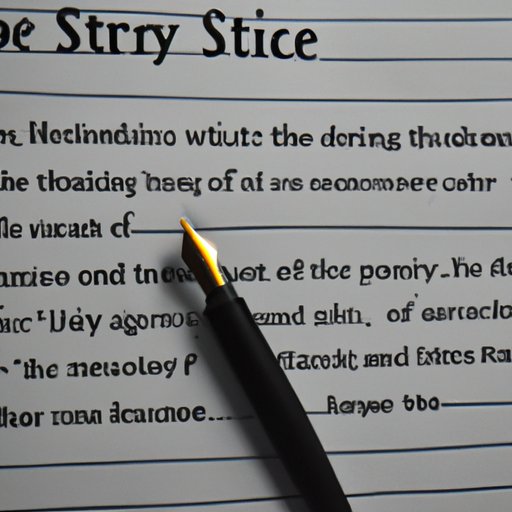Introduction
Tragedy has been a major part of literature since ancient times. It is a genre that has captivated readers for centuries with its gripping stories of flawed heroes, intense conflicts, and heartbreaking endings. But what is a tragedy in literature? This article seeks to answer this question by exploring the definition of tragedy, analyzing some of the most famous examples of tragedy in literature, investigating the role of tragedy in literature, and discussing the significance of tragedy in modern literature.

Exploring the Definition of Tragedy in Literature
Tragedy is a genre of literature that tells the story of a protagonist’s downfall. The protagonist is typically an individual with a tragic flaw who is faced with a difficult situation that leads to their downfall. Tragedy often includes themes of suffering, loss, and death, as well as a sense of inevitability and catharsis.
It can be difficult to differentiate between tragedy and other literary forms such as comedy or drama. While all three genres involve storytelling, tragedy focuses on the negative aspects of human experience, while comedy and drama focus on more positive aspects. Tragedy also differs from these genres in terms of structure. Tragedy often follows a specific structure known as the “three unities”: action, time, and place. This structure dictates that the entire story must take place within a single day, at a single location, and feature only one main plotline.
Tragedy also differs across cultures. For example, Greek tragedies focus on the power of fate and honor, while Shakespearean tragedies are more concerned with the inner psychological battles of the protagonist. Despite these differences, all tragedies share certain common elements such as a tragic hero, a reversal of fortune, and a sense of inevitability.
Analyzing Famous Examples of Tragedy in Literature
Many of the most famous examples of tragedy in literature come from the works of William Shakespeare. Plays such as Romeo and Juliet, Macbeth, and Hamlet are widely considered to be among the greatest tragedies ever written. These plays are characterized by powerful emotions, complex characters, and intense conflicts.
Another classic example of tragedy in literature is Sophocles’ play Oedipus Rex. This play tells the story of Oedipus, a man who unknowingly kills his father and marries his mother. The play examines the consequences of Oedipus’ actions and how he is ultimately unable to escape his fate. Oedipus Rex is an example of classical tragedy, emphasizing the power of fate and the inevitability of suffering.
Euripides’ The Bacchae is another important example of tragedy in literature. This play tells the story of Pentheus, a man who tries to suppress the worship of Dionysus, only to be punished by the god. The Bacchae examines the destructive power of unchecked pride and the consequences of challenging the gods.
Investigating the Role of Tragedy in Literature
Tragedy plays an important role in literature. It is a way for writers to explore the darker aspects of the human condition and examine the consequences of our actions. Tragedy often serves as a cautionary tale, warning us against hubris and encouraging us to think about the consequences of our decisions.
Tragedy also serves as a form of entertainment. By engaging readers with stories of tragedy and suffering, writers can create a powerful emotional connection with their audience. Tragedy can also help readers to empathize with characters and gain a better understanding of the human experience.

Exploring How Writers Create a Tragic Narrative in Literature
In order to create a successful tragedy, writers must establish conflict and tension between characters. This can be done by creating characters with opposing goals and desires, or by introducing external forces that threaten to disrupt the status quo. Writers must also create characters with flaws, as it is these flaws that will ultimately lead to their downfall.
Language is also an important element of tragedy. Writers use language to heighten the emotional impact of their stories and draw readers into the narrative. By using vivid descriptions and emotive language, writers can create a sense of dread and despair that will keep readers engaged until the story’s conclusion.

Examining the Impact of Tragedy on Characters in Literature
Tragedy can have a profound impact on characters in literature. It can cause characters to suffer emotionally, physically, and psychologically. It can also force characters to confront difficult truths about themselves and their relationships with others. Tragedy can also lead to feelings of guilt, shame, and regret.
The impact of tragedy on characters also depends on their ability to overcome it. Some characters are able to find strength in the midst of adversity, while others succumb to despair. In either case, tragedy can shape the character’s outlook on life and lead them to make difficult decisions.
Comparing and Contrasting Different Types of Tragedies in Literature
Tragedy can take many different forms in literature. Classical tragedy follows a specific structure and focuses on the power of fate and the inevitability of suffering. Modern tragedy, on the other hand, is more focused on the internal struggles of the protagonist and often features a less rigid structure. Tragicomedy combines elements of both tragedy and comedy, allowing writers to explore the lighter side of tragedy.

Discussing the Significance of Tragedy in Modern Literature
Tragedy remains an important part of literature today. Writers continue to explore the darker aspects of human experience through stories of loss, suffering, and death. At the same time, they are finding new ways of telling tragic stories, such as through the use of nonlinear narratives and unreliable narrators.
Tragedy also continues to have a significant impact on readers. By engaging readers with stories of tragedy and suffering, writers can create powerful emotional connections and provide insight into the human experience.
Conclusion
Tragedy is a genre of literature that has captivated readers for centuries. It is a genre that explores the darker aspects of the human experience and examines the consequences of our actions. This article has explored the definition of tragedy, analyzed some of the most famous examples of tragedy in literature, investigated the role of tragedy in literature, and discussed the significance of tragedy in modern literature.
By understanding what is a tragedy in literature, we can gain a greater appreciation for the genre and its ability to engage readers with stories of tragedy and suffering. We can also gain insight into the human experience and gain a better understanding of our own lives.
(Note: Is this article not meeting your expectations? Do you have knowledge or insights to share? Unlock new opportunities and expand your reach by joining our authors team. Click Registration to join us and share your expertise with our readers.)
